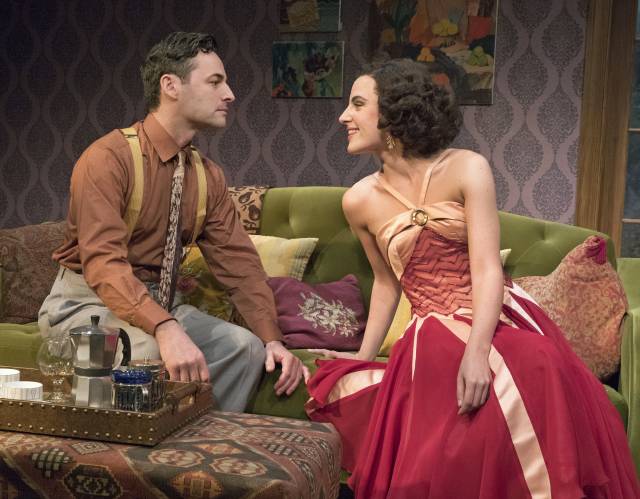

It’s strange to think that the more time moves forward and society advances, the more prudish our culture becomes. Watching the world premiere production of Yours Unfaithfully at the Mint Theater’s home in Theatre Row feels surreal because the play is more sex positive and forward thinking than anything to come out in the last decade. Combining two of playwrights’ favorite topics - writing and sex - the plot centers on the marriage of Stephen (Max Von Essen) and Anne (Elisabeth Gray), who are currently entering a phase of ennui in their eight year long marriage. He’s a writer who has run out of ideas, she’s a progressive teacher who figures out the best way to get her husband’s creative juices running again is to encourage him to have an affair with their friend Diana (Mikaela Izquierdo), a beautiful widow who lost her husband in a plane crash.
The characters in Yours Unfaithfully live in a Noel Coward-like world of languorous tea afternoons, cocktails for lunch, and invitations to spend the weekend in Paris, all of which help us enter their world of decadence. After all, the play was written in 1933 by Miles Malleson, and it captures the need for pleasure that characterized some of the best art of the era between the two World Wars. In the films of Ernst Lubitsch, the plays of Coward, the songs of Cole Porter, and the paintings of Tamara de Lempicka, the world was captured through the lens of “what if,” their universe wasn’t one of denial of the horrors that had marked the first part of the century, but of refusal to let this define what would come next. Of course they didn’t know that WWII would be even more devastating, so to experience art made during the years of peace is quite bittersweet.
One can only imagine how scandalous a play about an open marriage would’ve been back in 1933, if one is limited by the conception of what morality is in the 21st century where violence is consumed in the open daily, but sexuality is confined to whispers and forbidden corners. Therefore even if Yours Unfaithfully, isn’t “contributing” anything new to the form, or saying anything “important”, its very existence is a political statement that proclaims only we should be allowed to decide what to do with our bodies and how to fulfill our pleasure. It’s rather progressive that Malleson perfectly shows how the central marriage is only threatened when jealousy and external interference come into the equation. We are not asked to judge or understand why Stephen and Anne have chosen this kind of relationship. We are merely shown it and it’s up to us whether we agree with it or not.
The Mint Theater company has put together a remarkable production anchored by Gray and Von Essen, who seem to have manifested from a Lubitsch wet dream, both oozing continental charm and the kind of sensuality that’s more powerful because of how many layers of clothes are covering it. Watching the two engage in the rich dialogue makes one too yearn for a time when culture and philosophy were at the center of conversation, and the idea of past fascism was much too scary, or too real, to focus on. To call the play escapism would be an easy way out, to call it aspirational would sound much more refreshing.